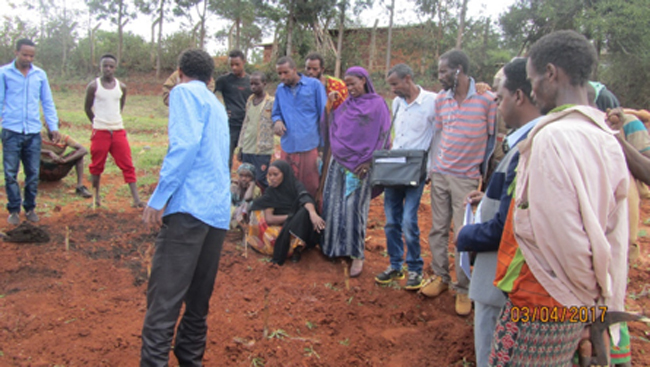

Soil fertility training in Uganda and for the first time, in Ethiopia, marked as a success
July 19, 2017
In March this year, the Crawford Fund organized another series of workshops on soil fertility, this time in Uganda and Ethiopia. This follows earlier training in September 2015 and 2012. With a focus on women, the goal was to empower subsistence farmers in the Harar region of Ethiopia and peri-urban Kampala, Uganda, by linking soil tests to fertilizer use to improve the resilience of crop yields and increase family income. Although this was the first time this series of workshops was conducted in Ethiopia, it was the third series of workshops for Uganda, with local farmers even facilitating and conducting workshops, supported by teaching aids and project staff. In Uganda, the workshops were also designed to quantify the adoption of a previous soil fertility training courses.
Led by Mr. David Collins, Greening Australia and Dr. Innocent Muhereza, Canadian Cooperative Association (CCA), the success of the workshops in Uganda was reflected in attendance numbers, with over half of the targeted 120 predominantly female farmers, attending the first of three planned workshops. And although reluctant at the beginning, attendance was boosted in Ethiopia once trust was established, as experienced when implementing the initial series of workshops in Uganda.

Results of the training have so far been very promising with 71% of the participants indicating a significant yield response to improved fertiliser practice, resulting in a surplus of produce sold and increasing the family income. Participants reported spending extra income primarily on education, health care and clothing for children.
The impact of the training was felt especially at the Harar Agriculture ATT (Agro Technical and Technology) College in Ethiopia. Surrounded by rugged terrain, with an elevation of 3000m and an 8-hour drive from the capital, Addis Ababa, Harar has very limited external contact.
“This was the first time any of the staff had been able to conduct a soil analysis test and there was much excitement when the first results came through, and the status of their soils was known,” said Mr. Collins.
“This knowledge will allow the staff to design appropriate field trials for the students and the local farmer groups that they work with.”
Students who attend the College come from all over Ethiopia so it is anticipated that when they graduate in September 2017, they will take their knowledge of soil analysis back to their home districts. With the general population being rural-based, subsistence farmers, training like this has the potential to create great impact.




 0
0